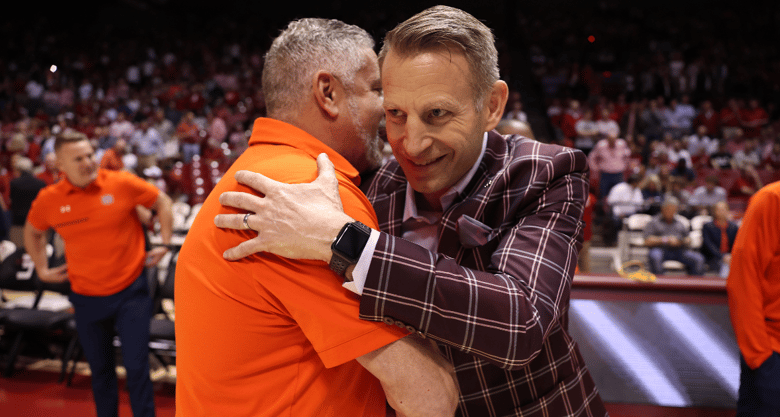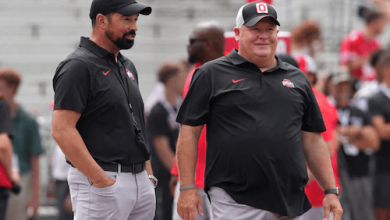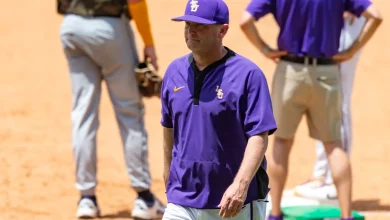‘For all the bragging rights’ is the slogan for Bruce Pearl and Nate Oats’ biggest matchup?

The world of college basketball is filled with rivalries, iconic coaches, and moments that transcend the game. In recent years, one of the most compelling narratives in the Southeastern Conference (SEC) has been the rise of two coaching powerhouses: Bruce Pearl of Auburn and Nate Oats of Alabama. Both of these men have managed to build elite programs, cultivate passionate fanbases, and bring a level of intensity and excitement to the SEC that is unmatched. As their programs have evolved, the rivalry between Pearl and Oats has become one of the most anticipated matchups in college basketball, embodying not just the future of their respective schools but also the broader trends shaping the sport.
The slogan “For All the Bragging Rights” perfectly captures the essence of their biggest matchup, as it underscores the stakes involved: a battle for supremacy in the SEC, national recognition, and—perhaps most importantly—respect. But beyond just wins and losses, this rivalry symbolizes two different philosophies of coaching, two different approaches to the game, and two different visions for the future of their teams. Each contest between Bruce Pearl and Nate Oats carries with it a sense of urgency, drama, and significance that goes far beyond the typical conference game.
The Coaches: Bruce Pearl and Nate Oats
Before diving into the specifics of their matchups, it’s important to understand the backgrounds and coaching styles of the men involved. Bruce Pearl, the charismatic and energetic head coach at Auburn, has built a program that combines high-octane offense with gritty defense. Known for his ability to recruit top-tier talent and his infectious enthusiasm on the sidelines, Pearl has turned Auburn into a perennial contender in the SEC. Under his leadership, the Tigers have experienced their greatest success in program history, reaching the Final Four in 2019 and winning SEC titles.
Pearl’s reputation extends far beyond his success on the court. He’s become one of the most recognizable figures in college basketball, thanks in part to his colorful personality, memorable interviews, and ability to connect with both players and fans. His style of coaching is predicated on a free-flowing, fast-paced game that emphasizes offensive freedom. He encourages his players to be aggressive on both ends of the floor, pushing the pace on offense and using their athleticism and quickness to disrupt opposing teams defensively.
On the other hand, Nate Oats, the head coach at Alabama, has quickly emerged as one of the brightest young minds in college basketball. Oats took over an Alabama program that had struggled for years, but in just a few seasons, he transformed it into one of the most innovative teams in the country. Oats is known for his “modern” approach to basketball, incorporating analytics and a style of play that prioritizes three-point shooting, spacing, and up-tempo offense. His system has turned Alabama into one of the most efficient offensive teams in the nation while still maintaining a strong defensive identity.
Oats’s philosophy of “pace and space” has garnered attention not just for its effectiveness but also for its ability to adapt to the changing landscape of college basketball. His coaching style is direct and methodical, often focusing on getting the best shots possible, whether that’s a three-pointer in transition or an easy layup. His emphasis on shooting and spacing the floor has reshaped how Alabama plays the game, making them a constant threat to any opponent.
Though both coaches share a penchant for exciting, high-tempo basketball, their strategies reflect different approaches. Pearl leans on his team’s athleticism and aggressive defense, while Oats places more emphasis on efficiency, shot selection, and exploiting mismatches in spacing. As a result, their meetings have become an exciting clash of philosophies—a battle between fast-break basketball and floor spacing, high-energy defense and calculated offensive execution.
The Rivalry: A Modern SEC Showdown
The matchup between Auburn and Alabama has become the centerpiece of SEC basketball in recent years, and much of that has to do with the programs’ rise in prominence under their respective coaches. Over the past few seasons, both teams have consistently found themselves near the top of the conference standings, often battling for the title of SEC champion. These matchups have carried tremendous weight in determining not only the outcome of the SEC regular season but also the trajectory of both teams’ NCAA Tournament aspirations.
One of the key dynamics in this rivalry is the geographic and cultural significance of both schools. Auburn and Alabama are located in the heart of the SEC, and the fanbases at both schools are intensely passionate. The Auburn-Alabama rivalry extends beyond basketball, with the two schools having a legendary rivalry in football that dates back over a century. That rivalry, known as the “Iron Bowl,” serves as a backdrop to every other competition between the two schools. In that sense, every Auburn-Alabama basketball game feels like an extension of a much larger, year-round battle for supremacy in the state of Alabama.
What makes the basketball version of this rivalry so special is that, while it may never have the same historical weight as the Iron Bowl, it still carries tremendous significance for both teams. A win in this rivalry is about more than just bragging rights—it can propel a team to a conference championship, a higher seed in the NCAA Tournament, and a stronger recruiting class. Every meeting between Pearl and Oats is a chance to demonstrate not just which team is better on the court that day, but which coach has a clearer vision for success.
Moreover, the personal dynamic between Pearl and Oats adds another layer to this rivalry. Both men have their own unique personalities, and their interactions have often been marked by mutual respect but also the kind of competitive fire that only exists in a high-stakes rivalry. Pearl, with his gregarious nature and years of experience, and Oats, with his innovative coaching style and youthful intensity, present two contrasting yet complementary figures in the SEC.
The High Stakes: More Than Just a Win
When you break down the stakes of a matchup between Auburn and Alabama, it becomes clear that this is about far more than a simple conference game. These contests often have significant implications for the SEC standings, national rankings, and even postseason positioning. In a conference as competitive as the SEC, where schools like Kentucky, Tennessee, and Arkansas are also constantly in the mix, every game can have far-reaching consequences for a team’s season.
For Bruce Pearl, a win over Alabama is more than just a statement about Auburn’s superiority in the SEC. It’s a chance to solidify his place among the elite coaches in the country. Pearl has already proven that he can build a championship-contending program, but victories over Alabama in a competitive environment would further cement his legacy as one of the top figures in college basketball.
For Nate Oats, a win over Auburn is a way to continue the momentum he has built since taking over the Alabama program. Oats has already had great success in the SEC, but his rivalry with Auburn offers him the opportunity to truly establish Alabama as a power in the conference. Beating a well-established program like Auburn, especially in such a high-profile matchup, would send a strong message to the rest of the country that Alabama basketball is here to stay.
But perhaps the most important aspect of the rivalry is the impact it has on recruiting. In college basketball, talent acquisition is everything, and programs like Auburn and Alabama understand the importance of attracting the best players. A big win in this rivalry not only boosts a team’s national profile but also gives it the edge in recruiting battles for top-tier talent. Recruits watching these games are often drawn to the excitement, intensity, and atmosphere surrounding the rivalry, which can ultimately influence their decision-making process.
The Fans: A Passionate and Divided State
The intensity of this rivalry is amplified by the fierce passion of the fanbases at both Auburn and Alabama. Auburn’s fans are known for their raucous support of their basketball team, packing Auburn Arena with noise and energy. The “War Eagle” chants echo throughout the arena, and the student section plays an integral role in creating a home-court advantage for the Tigers.
On the other side, Alabama’s fanbase is equally fervent, with Coleman Coliseum often filled with supporters eager to cheer on their Crimson Tide. Alabama’s basketball fans, much like their football counterparts, are known for their loyalty and commitment to the program. The rivalry between Auburn and Alabama, particularly in basketball, brings out the best in both fanbases, each group eager to prove that their school is the true dominant force in Alabama basketball.
The Rivalry for the Ages
The matchup between Bruce Pearl and Nate Oats is about more than just basketball. It represents the convergence of two distinct coaching philosophies, two elite programs, and a passionate rivalry that transcends the sport. “For All the Bragging Rights” is a fitting slogan for this monumental clash because, in many ways, every game between Auburn and Alabama feels like a battle for supremacy—not just in the SEC, but in college basketball as a whole.
The stakes are high, the competition is fierce, and the implications stretch far beyond the basketball court. As long as Bruce Pearl and Nate Oats remain at the helm of their respective programs, their rivalry will continue to be one of the most compelling storylines in college basketball. In this battle for bragging rights, one thing is certain: fans of Auburn and Alabama alike are in for many more years of thrilling basketball action.









